Dealing With Menopause Neck & Shoulder Pain

Experiencing menopause neck or shoulder pain? It’s not in your head.
32% of women experiencing menopause symptoms also report joint and muscle pain in these areas (Dempsey, 2024).
Typically, these symptoms are linked to fluctuating hormones, sleep disruptions, and stress. But you don’t have to push through the pain.
You can try simple at-home strategies to ease discomfort and improve your sleep. Here’s what you need to know about menopause and perimenopause neck and shoulder pain.
How To Relieve Neck and Shoulder Pain During Menopause
From sleepless nights to constant aches, it’s important to manage your symptoms. Let’s look at some ways to relieve menopause neck pain and shoulder discomfort.
Gentle Stretches & Yoga
Incorporating light stretching or yoga into your daily routine can work wonders when it comes to menopause shoulder pain or neck discomfort.
Poses that gently open the shoulders, stretch the neck, and release tension (e.g., Child’s Pose or Neck Rolls) are especially beneficial. These movements improve flexibility and reduce cortisol, which can spike during menopause.
One study even suggested that yoga may help with the extra stress and psychological symptoms of menopause in the short term (Cramer et al., 2012). So, add these calming stretches to your routine!
Sleeping Adjustments
Experiencing pain at night?
Adopting a healthy sleeping position is the best line of defence against strain and reduces menopausal discomfort while sleeping. However, you can also use memory foam pillows as reinforcements.
The Groove Adjustable Neck Pillow is explicitly designed to support the natural curve of your spine, relieving pressure points and encouraging deeper, more restorative sleep.
You can even edit the pillow to your body’s needs, allowing for customised support and a noticeable difference in how your neck and shoulders feel in the morning.
Shop Groove Adjustable PillowRegular Physical Activity
It’s time to get up and active, with gentle caution!
Regular, low-impact exercise, such as walking, swimming, or Pilates, helps keep joints mobile and muscles strong. Activity also improves blood flow, reduces stiffness, and improves the body’s natural anti-inflammatory response.
Hormone Replacement Therapy (HRT)
Lastly, some women find that Hormone Replacement Therapy (HRT) helps alleviate musculoskeletal symptoms.
These medications can alleviate symptoms and prevent osteoporosis but require careful consideration of risks (Peacock and Ketvertis, 2023).
Talk to your GP or healthcare provider to see if HRT is suitable for you.

Natural Ways To Relieve Menopause Neck & Shoulder Pain
The lifestyle changes above can help with menopausal and perimenopausal neck pain.
However, for extra relief, you can explore natural remedies for neck and shoulder discomfort, such as:
1. Heat or Cold Therapy — Use a warm compress to soothe tight muscles, or a cold pack to reduce inflammation after a flare-up. Try these before bed or in the morning for effective results.
2. Massage Therapy — A targeted massage on the neck/shoulder area can help release knots, improve circulation, and reduce pain.
3. Mindfulness and Stress Reduction — Did you know stress can manifest physically? Constant stress can lead to neck and shoulder pain. You can combat this with mindfulness and deep breathing exercises to help your muscles relax.
4. Nutritional Supplements — Supplements that support joint health and reduce inflammation can make a subtle difference. Look for magnesium, omega-3, and vitamin D next time you’re in the health aisle. However, always check with a healthcare professional before starting a new regimen.
Neck & Shoulder Pain During The Menopause
Neck and shoulder pain during menopause is common, and knowing what’s causing these issues can help you manage them.
First, you need to know about estrogen. This hormone plays a key role in collagen production, anti-inflammatory processes, and regulating the menstrual cycle (Johns Hopkins Medicine, 2025).
As estrogen levels decline during perimenopause and menopause, the body’s ability to maintain muscle mass, joint lubrication, and collagen production decreases, often leading to joint pain, stiffness, muscle tension, and increased inflammation across your body.
This hormonal shift is also linked to frustrating conditions like frozen shoulder (also known as adhesive capsulitis) and tension headaches, which commonly arise from muscle tightness and poor posture.
Poor sleep posture can aggravate tension headaches. For extra relief, an adjustable pillow can help improve sleep posture and reduce headache frequency.
Shop Groove Adjustable Pillow
When to Consult a Healthcare Professional
If neck or shoulder pain persists or worsens, don’t ignore it. Visit your healthcare provider or urgent care. It could be a sign of arthritis, nerve impingement, or another underlying issue.
Likewise, if menopause is impacting your quality of life, speak with your GP or a menopause specialist, as there are effective hormonal and non-hormonal treatments to help you feel like your best self again.
The Takeaway
Navigating perimenopause and menopause can feel overwhelming.
Whether you’re experiencing menopause headaches from neck pain or shoulder aches, know that you can take control of your well-being with lifestyle changes like gentle stretches, stress reduction, and better sleep posture.
Improve your sleep today with specialised support. See the Groove Adjustable Neck Pain Pillow now.
Or jump to the Sleep Resources Hub for more advice.
References
- Cramer, H., Lauche, R., Langhorst, J. and Dobos, G. (2012). Effectiveness of Yoga for Menopausal Symptoms: A Systematic Review and Meta-Analysis of Randomized Controlled Trials. Evidence-Based Complementary and Alternative Medicine, [online] 2012, pp.1–11. doi:https://doi.org/10.1155/2012/863905.
- Dempsey, B. (2024). Joint Pain: An Often Overlooked Symptom of Menopause. [online] AARP. Available at: https://www.aarp.org/health/conditions-treatments/menopause-joint-pain/ [Accessed 15 May 2025].
- John Hopkins Medicine (2025). Estrogen’s Effects on the Female Body. [online] www.hopkinsmedicine.org. Available at: https://www.hopkinsmedicine.org/health/conditions-and-diseases/estrogens-effects-on-the-female-body.
- Peacock, K. and Ketvertis, K.M. (2023). Menopause. [online] National Library of Medicine. Available at: https://www.ncbi.nlm.nih.gov/books/NBK507826/.

